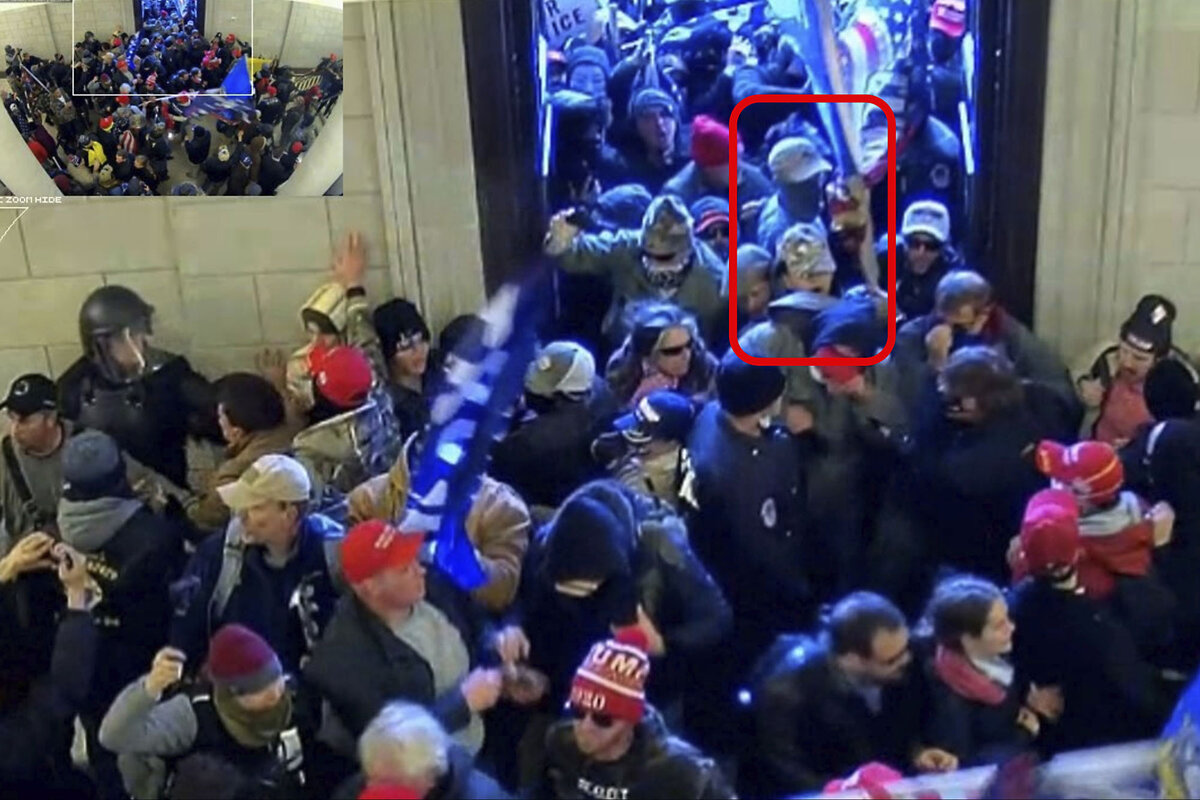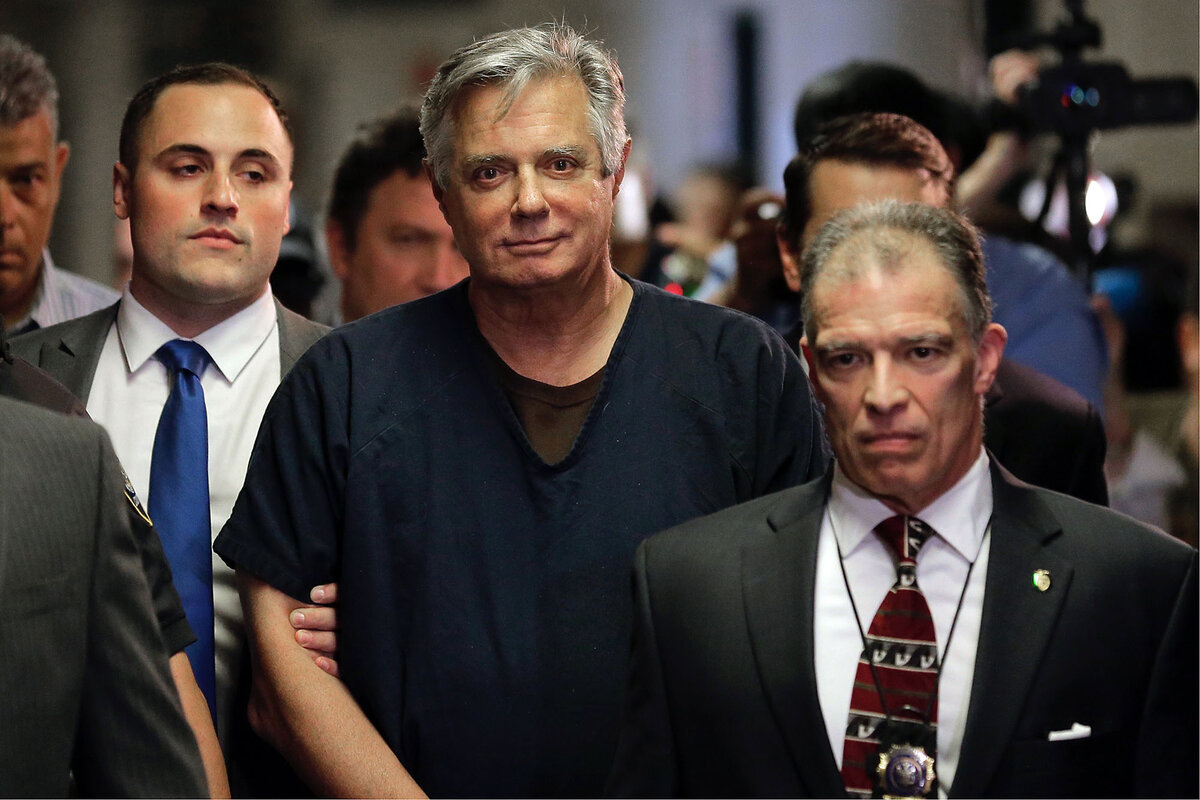Trump promised to pardon Jan. 6 felons. Where does that stand now?
Loading...
For millions of Americans, Donald Trump’s election victory was a cause for celebration. But for a select group, it meant more: the prospect of legal vindication.
When Mr. Trump ascends the Capitol steps in late January for his second inauguration, he will be standing where thousands of his supporters stormed the building four years prior. Protesting what he claimed – with no evidence – was a fraudulent loss in the 2020 election, Mr. Trump’s supporters attacked police officers, smashed windows, and ransacked congressional offices, trying to prevent the certification of the election.
Why We Wrote This
The Jan. 6, 2021, attack on the U.S. Capitol shook the peaceful transfer of power after a national election. President-elect Donald Trump says he’ll pardon many of the convicted rioters – a potentially controversial precedent.
Since then, the U.S. Department of Justice has charged over 1,100 individuals with crimes related to the Jan. 6, 2021, riots. Mr. Trump has promised to pardon all of these defendants. And while this use of executive clemency is troubling to some who condemn the assault on the Capitol, that act of clemency would in fact be constitutional.
The pardon power exists because America’s founders “wanted to provide some kind of check on the prosecutorial power of the executive,” says Michael Gerhardt, a professor at the University of North Carolina School of Law.
“It’s a way to correct an injustice,” he adds. “That’s how Trump will see it.”
For millions of Americans, Donald Trump’s election victory was a cause for celebration. But for a select group, it meant even more: the prospect of legal reprieve.
When Mr. Trump ascends the Capitol steps in late January for his second inauguration, he will be standing where thousands of his supporters violently stormed the building four years prior. Protesting what he claimed – with no evidence – was a fraudulent loss in the 2020 election, Mr. Trump’s supporters attacked police officers, smashed windows, and ransacked congressional offices, trying to keep him in office.
Since then, the U.S. Department of Justice has charged over 1,100 individuals with crimes related to the Jan. 6, 2021, riots. As he campaigned for a second term, Mr. Trump promised to pardon at least some of these Jan. 6 defendants. After he secured victory, those followers celebrated not just his triumph, but also the prospect of their own freedom.
Why We Wrote This
The Jan. 6, 2021, attack on the U.S. Capitol shook the peaceful transfer of power after a national election. President-elect Donald Trump says he’ll pardon many of the convicted rioters – a potentially controversial precedent.
Some who condemned the Capitol attack may find this use of executive clemency troubling. For example, at a sentencing in April, federal Judge Royce Lamberth warned of Americans resorting to “vigilantism, lawlessness and anarchy” if they don’t like election results.
Yet pardons would be perfectly constitutional. The pardon power exists because America’s founders “wanted to provide some kind of check on the prosecutorial power of the executive,” says Michael Gerhardt, a professor at the University of North Carolina School of Law.
“It’s a way to correct an injustice,” he adds. “That’s how Trump will see it.”
Where do the Jan. 6 cases stand now?
Six people died during or following the Jan. 6 attack, and some 140 police officers were injured, according to the Justice Department.
As of January, the department said 749 federal defendants have received sentences for criminal activity on Jan. 6. Charges in the attack have ranged from felony assault and use of a deadly or dangerous weapon, to misdemeanor entering or remaining in a restricted federal building.
The president has the power to issue a pardon, which would free a defendant and erase all records of that person’s criminal offense. However, the person charged or convicted must accept responsibility for the crime. As president, Mr. Trump could also issue a commutation, which would shorten or lessen a defendant’s sentence but keep their original offense on the books. Lawyers for some of the Jan. 6 defendants have already begun asking for sentencing delays.
Lawyers for one defendant, Christopher Carnell of North Carolina, filed a motion Wednesday asking to delay a hearing in the case due to the election result. Citing President-elect Trump’s “multiple clemency promises,” his lawyers wrote that Mr. Carnell, a “nonviolent entrant to the Capitol on January 6, is expecting to be relieved of the criminal prosecution that he is currently facing when the new administration takes office.”
The judge overseeing the case denied that request, but other Jan. 6 defendants are optimistic that they will be granted early release. One is Ronald McAbee, a former sheriff’s deputy in Tennessee sentenced in February to 70 months in prison on six felony charges – including assaulting an officer – related to his participation in the Capitol riot.
“Sitting in prison, listening to the election results ... I feel vindicated,” wrote Mr. McAbee in a note that his wife posted on social media. “Donald Trump has been elected ... and we are coming home! All the hardships we have endured are coming to an end.”
What kind of power does Trump have here? What has he promised?
The presidential pardon power is broad. Article 2 of the Constitution says the president can “grant Reprieves and Pardons for Offences against the United States, except in Cases of Impeachment.” Perhaps the most famous presidential pardon came when Gerald Ford pardoned Richard Nixon after the Watergate scandal.
“There aren’t really restrictions,” says Mark Osler, a University of St. Thomas School of Law professor.
“You can take issue with the morality of it, the policy of it, but not that he has the power to do it,” he adds.
Mr. Trump issued 138 pardons during his first term, including for political allies like Steve Bannon and Paul Manafort. Other pardons went to conservative celebrities like Joe Arpaio, an Arizona sheriff convicted of criminal contempt involving the treatment of unauthorized immigrants, and Dinesh D’Souza, who pleaded guilty to making illegal campaign contributions.
Describing the Jan. 6 defendants on the campaign trail as “political prisoners,” Mr. Trump promised on multiple occasions to pardon at least some of them. “If they’re innocent, I would pardon them,” he said in July.
The Trump campaign said, before the election, that he would decide pardons “on a case-by-case basis when he is back in the White House.”
For Professor Osler, that suggests “It’s going to be some [Jan. 6 defendants], not all” who receive clemency.
What would be the significance of such pardons, on this scale?
A widespread pardon of potentially hundreds of federal criminal offenders would represent an unusually sweeping and premeditated use of the pardon power.
President Jimmy Carter, who in 1977 fulfilled a campaign promise by pardoning hundreds of thousands of men who evaded the Vietnam War draft, is believed to be the only other president to make such a promise.
“We don’t see presidents talk about using the pardon power before they take office,” says Professor Osler. “It’s a very unusual promise to make,” he adds. “We’ll see how that plays out.”
President Carter’s blanket action proved controversial. George Washington’s pardon of participants in the Whiskey Rebellion – the first-ever use of the pardon power – was also unpopular with some.
A broad pardon of the Jan. 6 defendants is likely to be controversial as well. Some experts say it would be a troubling precedent, especially with regard to future elections.
A blanket pardon “sends a message of condoning violence against the United States and [condoning] violence to contest an election in the United States,” says Rachel Barkow, a professor at the New York University School of Law.
“If he commutes sentences or reduces them,” she adds, “that would say maybe that what they did is not OK, but they were overpunished.”










